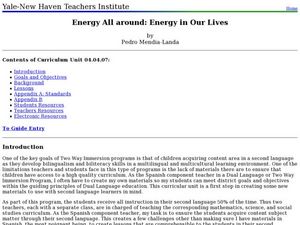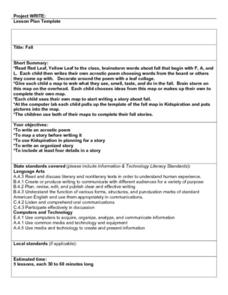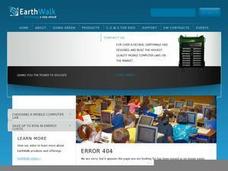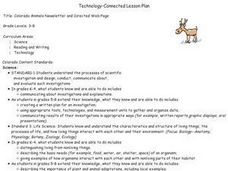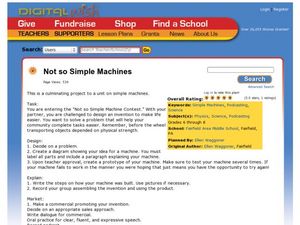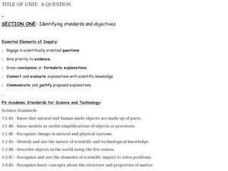Curated OER
Arctic Metaphors
In this metaphor worksheet, students are given a series of 5 questions to answer. This will lead them to write a metaphor on an Arctic theme.
Curated OER
Nature Metaphors
In this metaphor worksheet, learners read information about how to write a metaphor . Students are instructed to write some metaphors about nature in an unlined blank space.
Curated OER
The Physics of Cell Phones
Learners explain how cell phones work. In this physics lesson, students describe the advantages and advantages of having one. They identify the different parts of a cell phone.
Curated OER
Saving the Rainforests
Students search and study the various web sites on the rain forest. They determine parts of speech of each new word. Once this has been done, they read the composition first silently and then aloud. They demonstrate comprehension of the...
Jessica Winston
Tacky and the Winter Games
Helen Lester's wonderfully wacky, Tacky and the Winter Games, is the core text featured in a resource packet that includes a prediction exercise, an activity menu, vocabulary flash cards, and book review worksheet. A great way to cheer...
Curated OER
“THE LORAX” by Dr. Seuss
Few children's books convey the message of conservation as well as Dr. Seuss' The Lorax. Read the story aloud, emphasizing the interconnectedness of plants and animals in an ecosystem and discussing different ways people can help...
Curated OER
Polar Pals: Polar Bears & Penguins
First graders complete a variety of activities about polar bears and penguins including the "Blubber Mitten" experiment. They culminate the unit by creating a visual representation comparing and contrasting the two animals.
Curated OER
Energy All Around: Energy in Our Lives
Young scholars identify the different sources of energy. In this energy lesson, students list different machines and identify the type of energy used to operate them. They create a diagram of a wind turbine and label its parts.
Curated OER
Fall
Students read "Red Leaf, Yellow Leaf" then they brainstorm words about fall that begin with the letters F, A, and L. They compose and decorate their own acrostic poem then they write a Fall story and complete a final copy in the computer...
Curated OER
Land Use Issues
In this unit of lessons, students examine analogies and parts of speech. They use land use issues to identify the different parts of speech that they research. They create analogies about the origin of organisms.
Curated OER
Effects Of Natural Disasters On Environment
Students investigate the concept of how natural disasters effect the environment. They conduct research using a variety of resources. They are given a scenario that needs a defensive speech. Students take a position and defend it by...
Curated OER
N is for Natural State
For any pupils who live in the state of Arkansas, this would be a fabulous educational experience to help them get to know their state better. Through the use of activities in literature, art, mathematics, science, social studies, and...
Curated OER
Science: Suddenly Snow
Young scholars engage in snow-related activities during the first winter snowfall. After explaining the elements needed for it to snow, they preserve snowflakes on frozen slides and observe them under a microscope. Then, they write...
Curated OER
TE Activity: Sound Line
Students investigate the decibel readings of various noises. They determine why high-level readings damage hearing. Students arrange sound from the lowest to highest decibel levels when they written on a piece of paper.
Curated OER
Colorado Animals Newsletter and Directed Web Page
Students select a Colorado animal, develop a Directed Web page, and research their animal. Each member of the group combine their research and develop a Newsletter.
Curated OER
Not So Simple Machines
Students design a simple machine for a simple machine contest. In this simple machine lesson plan, students design a simple machine that will solve a problem. They draw a diagram, label it, and test the machine before they present it in...
Curated OER
A QUESTION
Students engage in scientifically oriented questions. They give priority to evidence, draw conclusions/formulate explanations and connect/evaluate explanations with scientific knowledge. Students communicate and justify proposed...







